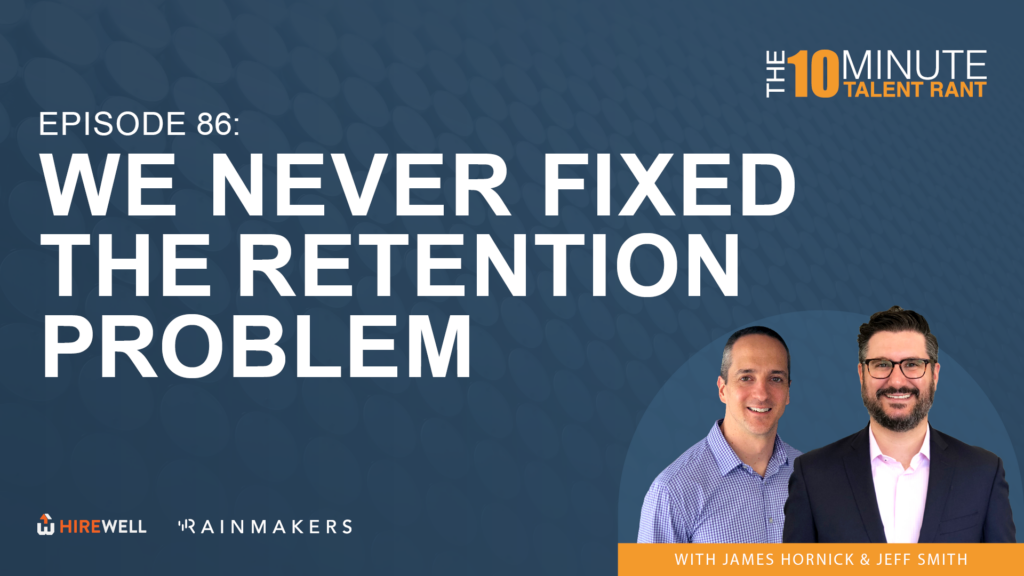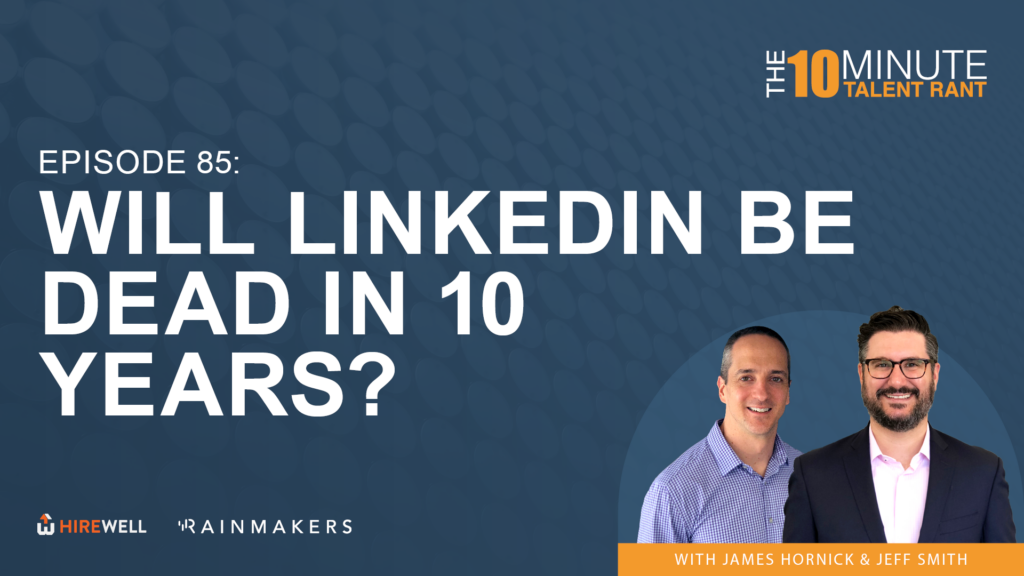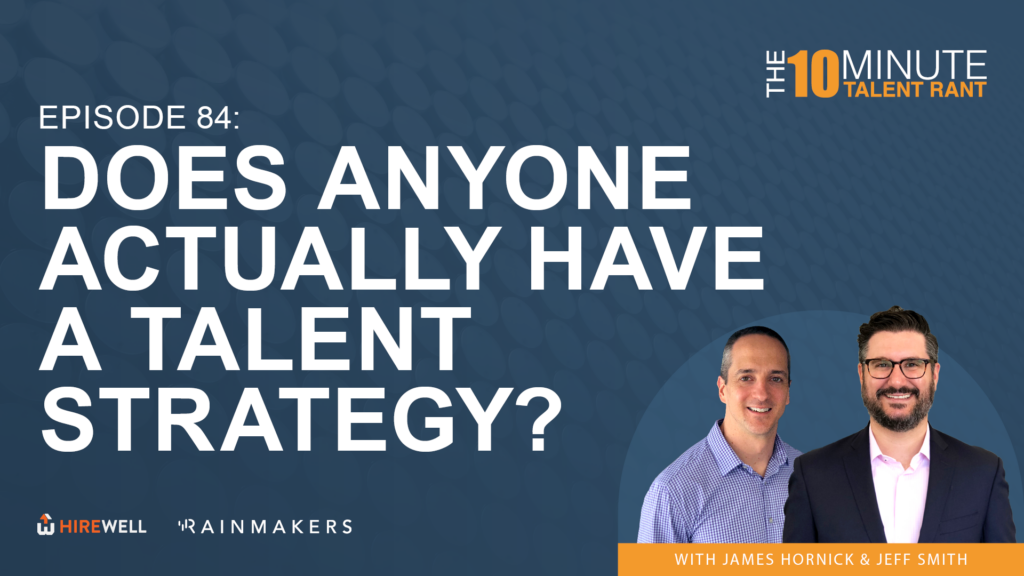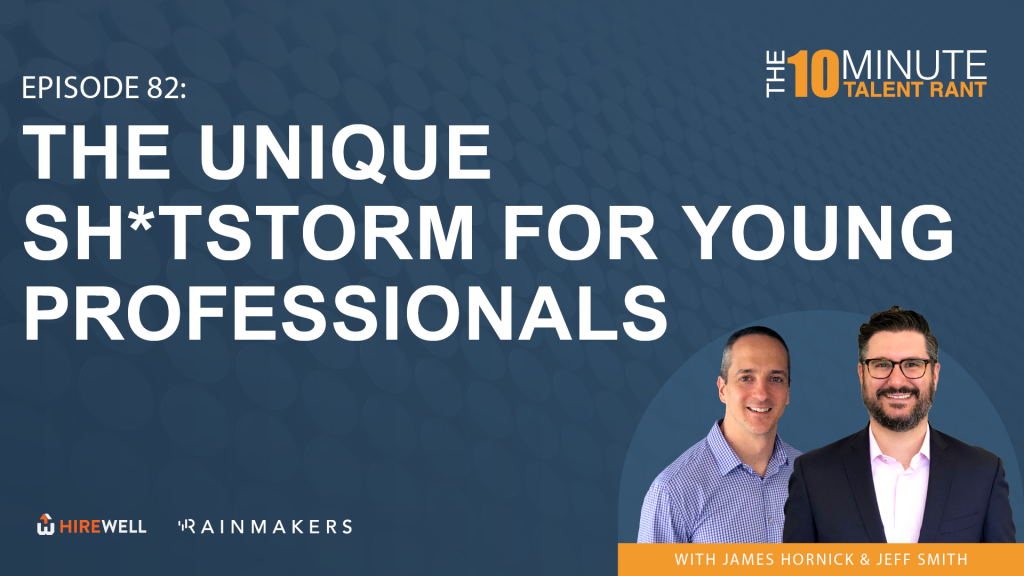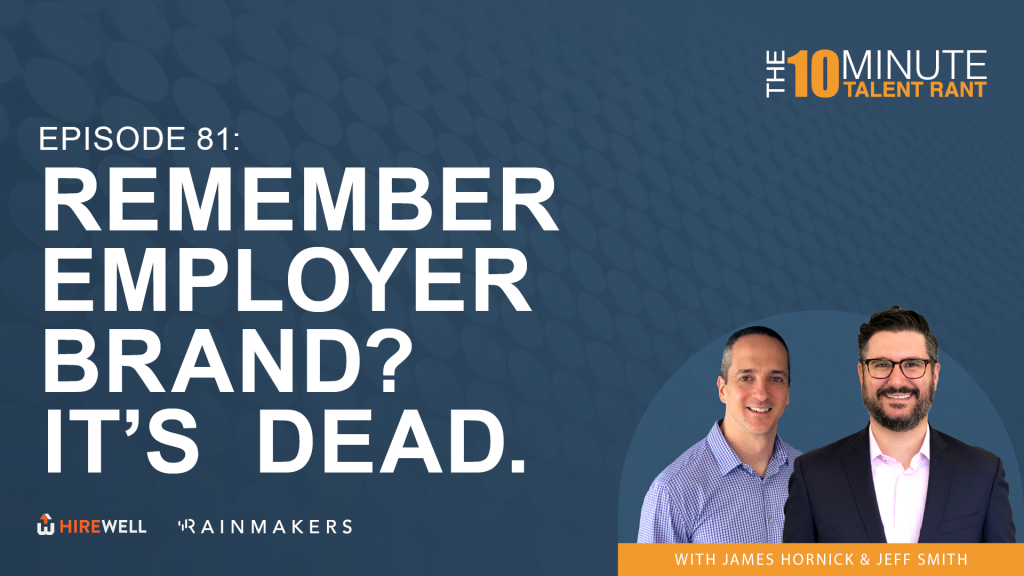The 10 minute talent rant is live. I’m James Hornick joined by Jeff Smith and we are on the clock. The 10 minute talent rant is our ongoing series where we break down things that are broken in the talent acquisition and hiring space and maybe even pitch a solution two. Before we dig in and remember to subscribe to Hirewell’s YouTube channel and the talent insights podcast,
where you can get all of our episodes. This week’s topic: the revolving door of recruiting and how to stop it. This is a philosophical conversation about the entire recruiting industry. So I want to make it clear- I’m not dumping on companies or recruiting firms or recruitment tech it’s really kind of soup to nuts how recruiting is done across the board.
And I think there’s a lot of things need to change. We’re going to make the case for that. If you just look as an example, the difference seen last year and this year, last year was insanely hard for recruiting. We’ve told people- we have an HR recruiting practice that recruits recruiters this year they’re gangbusters.
You know, there’s not enough recruiters to go around. Last year, no one hired anybody in recruiting. And not only that, I mean, there were layoffs, there were people who are great that couldn’t find a job. Just that dichotomy between like no one wanted you to all of a sudden you’re in that most, one of the most highest demand skills
it’s just crazy. And the thing that you have to remember is that like these recruiters who are suddenly in such a great position, they remember what last year was like and how no one wanted to give them the time of day. These memories don’t go away and it leaves a bad taste in a lot of people’s mouth.
Yeah. I think there’s something important here in that recruiters aren’t one-trick ponies, especially the good ones. They have a ton of value outside of just matching good companies with good people. And I’m talking both internally and externally here. This is again, it’s not one side of the coin or the other.
I mean- James you and I have plenty of friends just from our networks at Hirewell who have gone on to leadership, you know, even strong individual contribution roles that started in recruiting seats. They could have gone sales, they could have gone marketing. We’ve seen a few folks go into like hardcore management consulting.
These are the case studies that show that these folks are super versatile, right? Yeah. And I think to give everyone some perspective too, hiring, here’s the challenge. The hiring is not usually a sustained flatline, right? And when it is, it’s usually not that exciting. It’s binge flat, binge flat. Companies go through phases where they need to hire a lot
then it tapers off. They need to hire a lot more. So there’s some inherent challenges there. Recruiters are generally attracted to two things. So 1. organizations that have sustained exponential growth. It’s fun when you have a lot to do. It’s fun when you have a good story to tell, it gets people excited, it makes your job easier.
It’s not always possible. It’s just, unfortunately this is not the way the world works. But the other thing is opportunities to do more strategic work, more interesting things, then just digging ditches, just doing the tactical, finding people to fill jobs. There’s a lot more to recruiting and we’ll talk about that in a second as well, too.
That’s right. If you want to be great at hiring, you have to hire and retain the best recruiters. And those are your two levers, like sustain forever growth or more strategic thinking in terms of making the work more interesting and making the work easier, more effective. You know, the flip side is recruiters
they have to- they worry about companies that have tapered growth and that can’t think strategically about how they do hiring. That last one is incredibly important, so. I mean you mentioned that at the onset it’s one of these scenarios in which we forgive and we don’t forget. I, we being the recruiters like we have long memories.
We’re trying to think of a job- we couldn’t come up with one, maybe somebody that’s watching can but I can’t think of a job where the better you do, the more likely you are to lose your job because of the way that it’s structured. Like holy crap, we’re in a downturn, the senior suits say, who do we cut?
Where’s the payroll cut? Recruiters are not going to be recruiting anybody. We’re always the first ones. Professionally, it’s just looked at completely needlessly as totally transactional and completely tactical. And it couldn’t be further from the truth. Like there’s absolutely a strategy to recruiting.
And like, if you do some of these extra things outside of the day-to-day recruitment function, it actually helps you kind of set the stage for when those spikes occur. So let’s talk about what we mean my strategy here, because this hits on all levels. Look at whoever’s view of the recruiting industry
there is- start with job seekers. What are complaints job seekers have? Companies ghost on them, that they’re forgotten about, they slip between the cracks, the interviews are inefficient, people were asking them stupid questions. There’s clearly lots of things broken in people’s interviewing process and no one tends to be fixing them.
And these are things that can, if they’re actually fixed and done right, can help you hire more efficiently, get a better brand, get all that type of stuff and make your hiring easier. Look at it from like the agency view. Most contingent recruiting is still what is the most popular method out there.
Recruiters are stuck in these- recruiters at agency firms are stuck in these contingent held jobs where- I mean, we’re very open and what we’ve went from a contingency firm to primarily most of the work we do is retained larger scale engagements. Our fill rates went from 30% to like 97%.
Okay. Knowing that your work is not wasted and your time is not wasted is insanely fulfilling to you as the recruiter. But part of it too is like it’s ability to, there’s much more work that needs to be done besides just sourcing and being a glorified sourcing factory in terms of actually helping clients solve problems.
There’s lots of different things. There’s just so many inherent inefficiencies that can be addressed throughout all that. Yeah I mean, if you look at it from the company point of view as well, like I’m not saying altogether, but like we’ve seen enough instances, myself included being an internal person at a point in time.
Like everyone talks about data. There isn’t great data because the rest of the organization isn’t trained on how to input the data to make it clean. You’re relying on hiring managers and candidates and administrators to all put stuff into the ATS and it just doesn’t happen. You want to try and find repeatable candidate pools.
You want to have effective branding. Like all this stuff tends to be like this big giant fire drill that inevitably turns all of these- most of these internal recruiters into kind of transactional kind of chess pieces. And I think like when we think about fixes, you said it, you have to think about it strategically.
You have to think about like if you give a good recruiter the keys to the car, right? If they’re given the ability to move the needle for the entire recruitment process, nuts to bolts, they will make it more efficient. I mean bottom line. I think that you can build exceptional referral programs, you can teach managers how to interview.
And I don’t want this to sound like there’s an opportunity here just to do busy work, to do busy work, right? Like that’s not what we’re talking about. We want to enable the rest of the organization to recruit well so that when the spike happens, all the heavy lifting is already done and that’s where a recruiter can be really valuable.
So that’s the company side. If you look at the agency side, it’s the same thing. There’s so much opportunity for recruiting firms to become- ditch the recruiting model, become a more strategic partner. There’s firms already doing this. We’re one of them, but there are a lot of other ones out there. When things do need to go, like companies should be able to handle more of these peaks on their own
if they’re set up more strategically, have better processes in place. When those spikes kind of roll over, working with firms that actually are built to kind of assist in those other things too the extra, you know, if you’re going to hire a firm, they should actually be a subject matter expert for all the things you need them for.
They should be able to handle kind of all these processes not just in terms of, especially if it’s different skill sets and other areas you need. I think the other thing that’s important too, is like shameless plug: there’s so much turnover in the agency space. We have very little turnover at Hirewell and the reason why is because we take on projects that are more strategically minded, that are more entrenched in our client environments that actually have, you know, it’s more exciting work. We’re able to offer the recruiters that we work with here a continual run of different clients they can work with during their peaks and during their spikes
that makes it interesting for them, which is how we’re able to retain so well. Right. We’re actually, we’re one of the few firms out there that’s actually able to attract internal recruiters to come and work for us. Yeah. I want to hit on last things- we’re running out of time here too.
The last thing is recruitment tech because we kind of got lost all over this. What to do about the boring stuff? And here’s what drives me crazy about recruiting tech is there’s a lot of talk about AI doing this and that but all these AI tools out there, I mean it’s just another version of LinkedIn recruiter where it’s still doing Boolean searches.
Maybe it’s hitting some news sources. If you want to actually make it useful you have to create sourcing tools as an example that can actually tie into all your systems, tying all the word, your ATS system and make it actually like push a button and actually gives me something useful. Otherwise, it’s just more- like if you want to move the needle to make things more strategic for everything else that recruiter has to do. make your tools and your AI tools actually function where it’s not just recreating a wheel with an ex-widget.
The recruiter is going to be able to run those programs too, by the way. Yeah. Anyways, we’re short on clock. That’s a wrap. Thanks for tuning in the 10 minute talent rant, part of the talent insight series, which is always available for replay on the Hirewell YouTube channel as well as the talent insights podcast on apple and Google, Spotify and Amazon.
Jeff, thanks again. Everyone out there, see ya soon! You did great James, we killed it.








